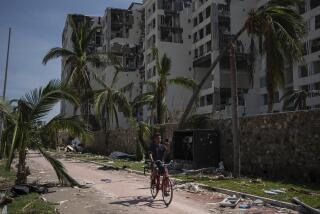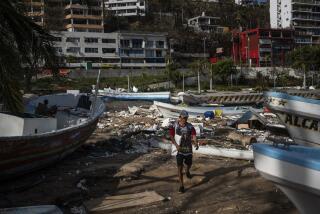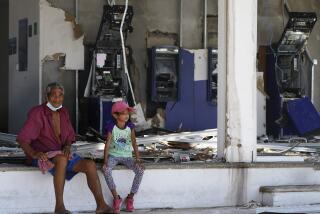Death toll, cleanup costs still mounting
As Floridians faced their second week of living with the aftermath of Hurricane Charley, hundreds of thousands spent their eighth night without electricity, and the hurricane’s death toll and cost estimates of the cleanup continued to climb.
Statewide, more than 300,000 residents still didn’t have power Friday, and some residents of Osceola, Polk, Charlotte and Lee counties may face several more days without it.
The death toll blamed on Charley rose to 25. A 68-year-old Collier County man died when he was either overcome by carbon-monoxide poisoning or the fire that destroyed a trailer where an electrical generator was being used, state officials said.
In Lee County, a 37-year-old man died of a head injury related to storm cleanup.
The American Red Cross said a preliminary survey of hurricane damage estimated 10,000 homes in Florida were destroyed by Charley, with 16,000 others suffering major damage. Nearly 29,000 homes had minor damage, the Red Cross said.
Damage to public facilities in Orlando, including utilities, roads and public buildings, has been estimated at $50 million, Orlando Mayor Buddy Dyer said Friday. The figure includes $2.5 million in roof damage at the TD Waterhouse Centre, but does not include cleanup costs.
Orange County officials said overtime for county employees is estimated at $3 million to $5 million, and debris removal could cost the county $24 million.
Gov. Jeb Bush pledged Friday to open all affected Florida schools, even in the hardest-hit areas of Southwest Florida, within two weeks.
With Federal Emergency Management Agency Director Mike Brown at his side, the governor toured Osceola County’s Poinciana High School, where the gym and cafeteria roofs were ripped off by the storm. Brown told education officials to worry about getting classes back in session, and not the cost.
“Spend whatever you need to spend,” Brown said. “Get this place back up and running and I’ll send you a check.”
Schools in Osceola, Seminole, Volusia and Orange counties are set to resume next week. But classes in Charlotte County, where seven schools were destroyed, won’t resume until at least Aug. 30.
An estimated 7,500 students were left without classrooms by the hurricane, and thousands of textbooks, computers and other equipment were lost, especially in Southwest Florida.
State education officials said they already have lined up the 93 portable classrooms and 72 school buses needed to replace those lost in the storm.
At a meeting with officials in Orange County, a FEMA official said the federal agency is trying to find a way to cover large insurance deductibles for hurricane damage.
“It’s not a done deal yet, but we’re trying to do it,” Ed Buikema, FEMA director for cleanup operations in Central Florida, told Orange County Administrator Ajit Lalchandani, Sheriff Kevin Beary and county department heads during Friday’s meeting at the county Emergency Operations Center.
Lalchandani said large insurance deductibles may be Central Floridians’ most pressing hurricane concern. Beary agreed, saying some residents have complained that “insurance companies are saying, ‘Ha ha; too bad.’ ”
Homeowners should apply for FEMA aid “instead of throwing your hands up,” Lalchandani said. “You might get it.”
So far, more than 75,000 Floridians have registered with FEMA for aid, and $13 million had been paid out by Friday. The agency can be reached at 1-800-621-FEMA.
State and local authorities continued to investigate allegations of price gouging for everything from hotel rooms to home repairs.
About 2,800 complaints have been received around the state, with Orange County generating about 500, more than any other county.
On Friday, police charged a tree trimmer in Volusia County with price gouging, and Osceola County deputy sheriffs arrested an unlicensed contractor. State officials sued a hotel in Ocala for allegedly inflating prices for refugees who had fled the approaching hurricane.
With Central Florida schools set to reopen for classes next week, law-enforcement officials warned motorists and children walking to and from bus stops and schools to use extra caution near storm debris. The large piles of brush that line many roads and streets will make it difficult to see children, officers warned.
In Punta Gorda, Charlotte Regional Medical Center, severely damaged when Charley made landfall nearby Aug. 13 with 145-mph winds, reopened its emergency room Friday, and hospital officials said they hope to reopen the entire facility by Sept. 6. All three hospitals in Charlotte County had to close or scale back services because of hurricane damage.
Democratic presidential candidate John Kerry, who canceled a scheduled campaign stop in Orlando this week because of Hurricane Charley, was given a tour of storm damage in Southwest Florida on Friday by U.S. Sen. Bill Nelson, D-Fla.
Secretary of State Glenda Hood said all Florida voters will be able to cast ballots in the Aug. 31 primary elections, despite delays in training poll workers and damage to polling places caused by the hurricane.
On Friday, the governor ordered a special election to be held in November to replace Hardee County Elections Supervisor Dean Cullins. Cullins, 60, died last week of a heart attack he suffered after cleaning up storm debris at his home.
Beth Kassab, Henry Pierson Curtis, Tania deLuzuriaga, Pedro Ruz Gutierrez, Sherri M. Owens, Susan Jacobson, Dan Tracy and Gary Taylor of the Sentinel staff contributed to this report. Roger Roy can be reached at rroy@orlandosentinel.com or 407-420-5436.
More to Read
Start your day right
Sign up for Essential California for news, features and recommendations from the L.A. Times and beyond in your inbox six days a week.
You may occasionally receive promotional content from the Los Angeles Times.






